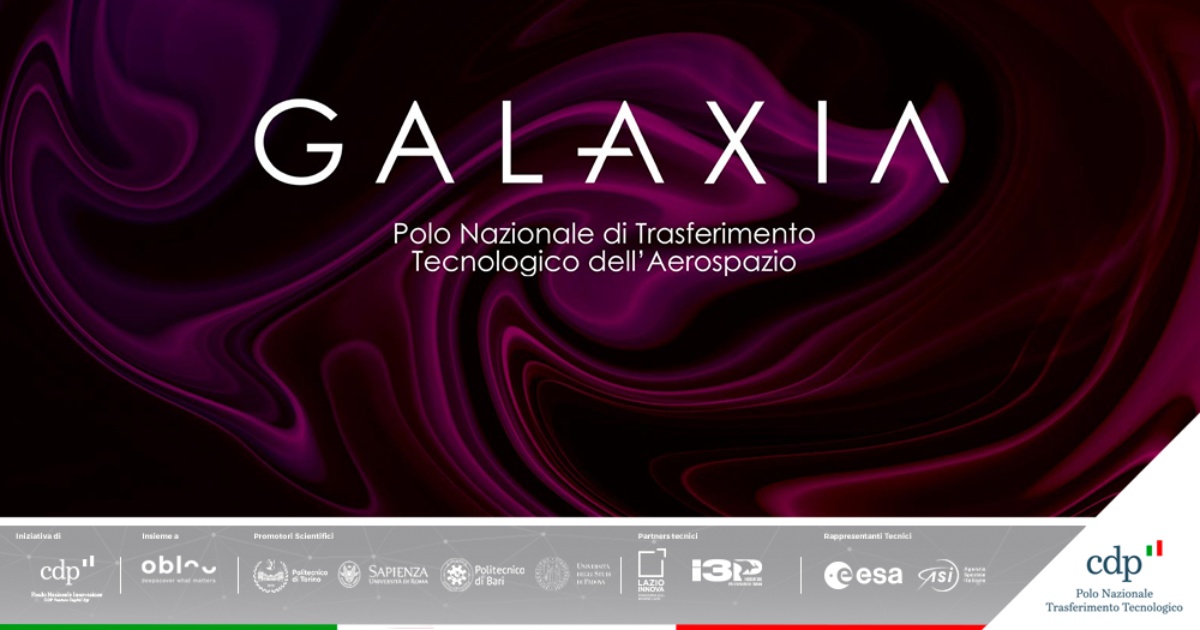CDP Venture Capital announced the launch of the investment activity of Galaxia, the Italian National Technology Transfer Centre for Aerospace, set up to give a concrete boost to the development of start-ups conceived within research laboratories specialising in the sector.
The new Pole will focus on the various application areas of aerospace: from upstream solutions - such as thrusters, rockets and satellites, sub-orbital spacecraft, telemetry tools and technologies for mission control centres - to downstream solutions - remote sensing technologies for Earth observation, satellite communication and navigation technologies and integrated applications of satellite navigation systems for specific uses - as well as in enabling technologies and in activities for the transfer of key technologies from space to ground (spin-out) or from ground to space (spin-in).
Galaxia will have a total target budget of around €30 million over the next four years, to invest in more than 30 new companies in the proof-of-concept (prototyping) and seed stages. The operation is led by CDP Venture Capital through its dedicated Technology Transfer fund, and will also involve the Italia Space Venture fund, set up in July 2022 as a support tool for innovative entrepreneurial initiatives in the space and aerospace sector through resources from the fund complementing the National Recovery and Resilience Plan (PNRR). Galaxia's entrepreneurial partner and co-investor is Obloo, a company with a significant track record of early-stage investments in deeptech and technology transfer start-ups, which will be in charge of scouting, due diligence and investment execution (or grounding), as well as portfolio monitoring. In addition, agreements with corporate partners are currently being finalised.
Galaxia's scientific promoters are, in particular, Politecnico di Torino and "La Sapienza" University of Rome, together with other leading Italian universities including the University of Padua and the Polytechnic University of Bari: their researchers will be able to access proof-of-concept (prototyping) investments and benefit from a specialised technical incubation service guaranteed by Obloo, with the aim of stimulating the market launch of research-produced inventions.
Obloo, Lazio Innova and I3P, the Innovative Companies Incubator of Politecnico di Torino, will also coordinate the business creation programme, made available nationwide to all start-ups resulting from research activities that will be selected by the Pole itself for seed investments. The technical incubation and business creation services also include the involvement of the European Space Agency (ESA) and the Italian Space Agency (ASI) as Galaxia's Technical Advisors. To strengthen the capacity to industrialise the technologies proposed by the researchers, the Pole is also finalising agreements with the main Italian Aerospace Districts.
The aerospace industry has seen a strong expansion in terms of both technological applications and players involved, especially in the last ten years. It is estimated that the sector will reach one trillion by 2040, from the current $450 billion. In Italy, specifically, the Space Economy generated a turnover of 18 billion euros in 2017, with over 60,000 employees: the country is the fourth largest in the world in terms of exports.
"The launch of Galaxia is another very important step in the path we are tracing to bridge the Italian gap in tech transfer and open up university laboratories to international markets," commented Enrico Resmini, CEO and General Manager of CDP Venture Capital. "Thanks to advances in research, aerospace technologies have proved to be crucial for the growth of many countries. Today, investing in these technologies is strategic in order to preserve a historical excellence of Italian industry and support the sector's rapid technological progress, which has developmental repercussions in the production and employment chains".
"La Sapienza in recent years has achieved excellent results in the aerospace sector and the launch of Galaxia represents an important step in the direction of strengthening our University's ability to promote research, innovation and technology transfer in high-tech sectors," commented Antonella Polimeni, Rector of "La Sapienza" University of Rome. "The Galaxia Pole is part of the various innovation and tech transfer initiatives that Sapienza is pursuing, including the regional innovation ecosystem Rome Technopole, in an area, that of the Lazio Region, which is home to the largest corporations operating in the aerospace sector".
"The aerospace sector is already fundamental to the economy as a whole and to the daily lives of each and every one of us," said Nicola Redi, Managing Partner of Obloo. "It is an area of great fascination, due to the complexity of its technological challenges to be explored and new business models to be designed. For us at Obloo, the collaboration with Galaxia represents the culmination of a 15-year experience in venture capital and venture building applied to research and technology transfer."
CDP Venture Capital, through the Technology Transfer Fund, invests in the entire technology transfer chain with the creation of national poles distributed throughout the country that federate leading universities and research centres of excellence to identify and finance the best deep tech technologies, accompanying them to the market. At the same time, the fund invests in sectoral funds to boost the growth of the best companies on the market. A system approach that leverages the most promising opportunities in Italian research to give rise to new generations of entrepreneurs and investors. As has already been the case for Robotics with RoboIT, for Environmental Sustainability with Tech4Planet, and for the development of new therapeutic approaches in the biopharmaceutical field with Extend, the clusters are the result of collaboration between public and private players to transform research results into innovation.

